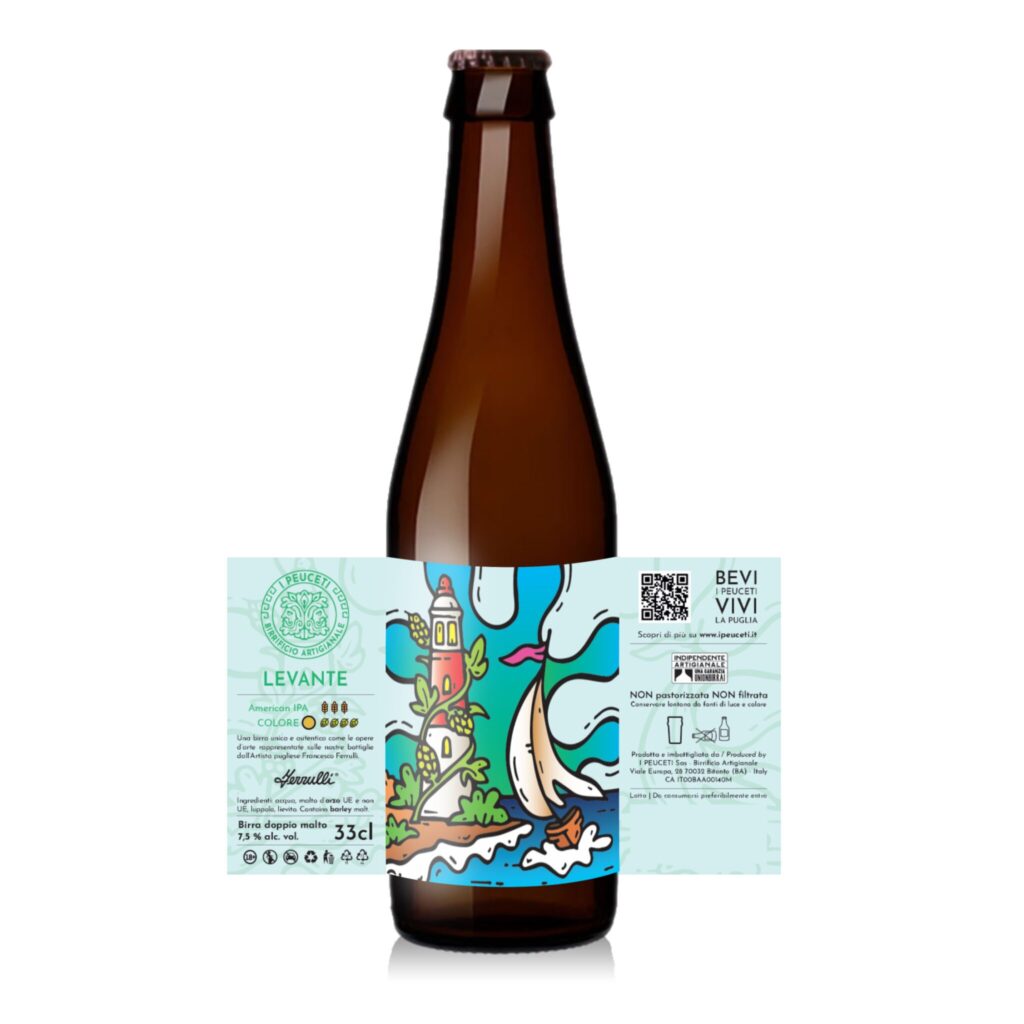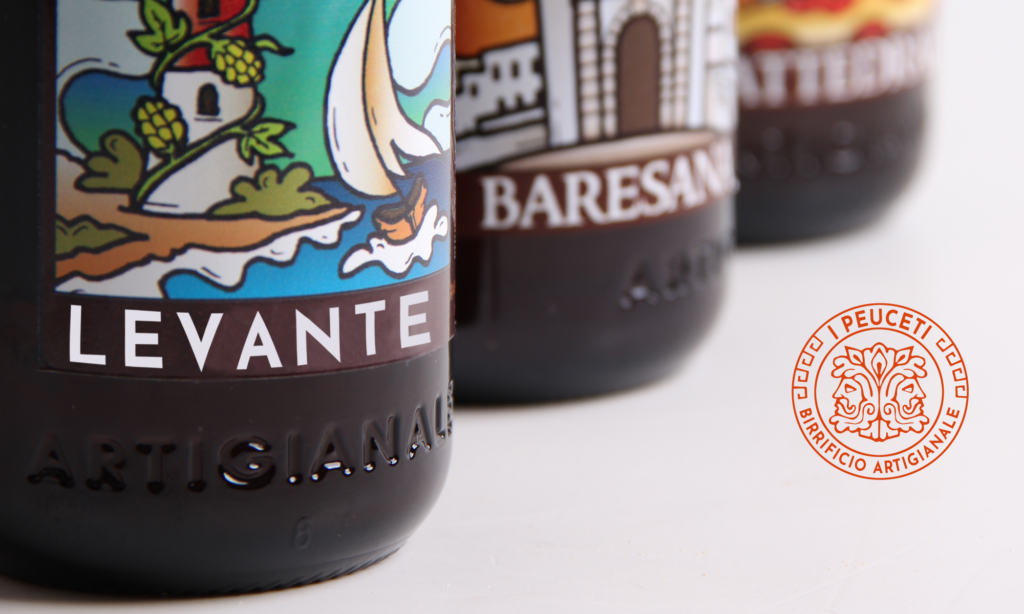x Le Mondial de la Bière June 20–22 in Montréal
In Italy’s sun-scorched heel, a new generation of brewers is transforming ancient grains and forgotten traditions into the peninsula’s most surprising craft beer renaissance
The trulli of Alberobello cast their conical shadows across the Itria Valley as dawn breaks over Puglia’s limestone plateau. In the converted masseria that houses Birrificio del Ducato’s newest outpost, brewmaster Elena Paradiso draws a sample from a tank containing her experimental grano arso ale—a beer that transforms the region’s tradition of “burnt grain” into liquid poetry.
“My nonna used to collect the charred wheat kernels left after the harvest,” Paradiso explains, her voice carrying the warm cadence of Barese dialect softened by years studying brewing science in Belgium. “The landowners considered it waste, but she knew it held concentrated flavor. Now we’re elevating that peasant wisdom into something extraordinary.”
This philosophy—transforming humble ingredients into sophisticated expressions of place—defines Puglia’s emerging craft beer movement. In a region better known for olive oil and primitivo wine, a quiet revolution is fermenting, one that speaks to both ancient agricultural wisdom and contemporary artisanal ambition.

The Granary of Innovation
Puglia’s advantages as a brewing region lie not in its climate—the scorching summers would challenge any hop garden—but in its extraordinary agricultural heritage. The region produces more wheat than anywhere else in Italy, with ancient varieties like senatore cappelli and saragolla providing complex flavor profiles that commercial brewing has long overlooked.
At Birra Salento, housed in a restored 18th-century palmento near Lecce, founder Domenico Montinaro has built his entire operation around indigenous grains. His Grano Antico series showcases varieties that predate industrial agriculture, each beer expressing terroir as distinctly as any natural wine.
“Industrial brewing treats grain as a commodity,” Montinaro observes, running wheat berries through his fingers in the brewery’s grain room. “We treat it as an ingredient with character, history, and flavor. These varieties have been grown in Puglian soil for centuries—they understand this place in ways imported grains never could.”
His flagship Primitivo Barrel-Aged Barleywine, matured in French oak previously used for the region’s signature wine, exemplifies this place-based approach. The beer opens with notes of dried fig and honey—flavors that echo the Salentine landscape—while maintaining the complexity expected by international craft beer enthusiasts.
Baroque Brewing
In Lecce, the “Florence of the South,” craft beer culture has taken root amid the city’s baroque splendor. Officina della Birra, occupying a vaulted stone cellar beneath Palazzo Vernazza, represents the aesthetic sophistication driving Puglia’s brewing renaissance. Owner and architect Raffaele Ingrosso designed the space to complement both the building’s 17th-century bones and modern brewing requirements.
“Lecce stone has natural temperature-regulating properties,” Ingrosso explains, gesturing toward the pietra leccese walls that maintain cellar conditions without mechanical cooling. “Our ancestors understood materials in ways we’re only rediscovering. The architecture becomes part of the brewing process.”
The brewery’s limited releases, packaged in bottles that reference the geometric patterns of Lecce’s baroque facades, have caught the attention of international collectors. Their Salento Sour, fermented with wild yeasts captured from olive groves, commands premium prices in London and Copenhagen—not for novelty, but for its uncompromising expression of Puglian terroir.

The Olive Connection
Perhaps no ingredient defines Puglia’s craft beer innovation more than the olive. At Birrificio Karma in Conversano, brewmaster Giuseppe Celeste has developed techniques for incorporating olive oil, olive leaves, and even olive wood into his brewing process—an approach that initially drew skepticism from purists but now garners international acclaim.
“Olive oil in beer sounds wrong until you taste it,” Celeste acknowledges, pouring his signature Monocultivar IPA, brewed with Coratina olive oil emulsified through a proprietary cold-extraction process. “The oil adds body and mouthfeel while the bitter compounds complement hop character. It’s not fusion—it’s evolution.”
The brewery’s collaboration with Slow Food Presidium producers has yielded remarkable results. Their limited-edition ales featuring everything from Altamura bread to Burrata whey demonstrate how craft brewing can celebrate and preserve traditional food culture while creating something entirely new.
Masseria to Market
The movement’s maturation is perhaps best exemplified by Agricola Strampelli, a working farm near Foggia that represents the integration of brewing with broader agricultural practice. Owner Marco Strampelli, descendant of the geneticist who developed many of Italy’s wheat varieties, approaches brewing as natural extension of his family’s century-long relationship with grain cultivation.
“We control every step from seed to glass,” Strampelli explains, walking through fields where ancient wheat varieties wave in the Tavoliere winds. “Our beers express not just terroir, but tempo—the rhythm of seasons, the patience of proper fermentation, the wisdom of traditional farming.”
The farm’s tasting room, converted from a 19th-century granary, offers vertical tastings of single-varietal wheat beers that demonstrate subtle differences between grain types. Visitors—increasingly including international beer tourists—can witness the complete cycle from field to fermentation tank to finished product.

Culinary Integration
The sophistication of Puglia’s craft beer culture extends beyond production into gastronomy. At Antichi Sapori in Montegrosso, chef Pietro Zito has developed what may be Italy’s most comprehensive beer and food pairing program, working exclusively with local brewers to create harmonious marriages between traditional Puglian cuisine and contemporary ales.
“Puglia’s food culture is about abundance and simplicity,” Zito explains, presenting a dish of sea urchin from the Adriatic paired with a delicate wheat ale brewed with Mediterranean herbs. “Our beers need the same qualities—generous flavor that doesn’t overcomplicate the essential ingredients.”
The restaurant’s success has inspired similar programs across the region, from the trulli country to the Gargano Peninsula. Sommeliers trained in wine are learning beer’s vocabulary, discovering how ale’s effervescence and varied flavor profiles can enhance rather than compete with Puglia’s robust culinary traditions.
Export Excellence
Recognition of Puglian craft beer quality extends well beyond regional borders. At Fico Eataly World in Bologna, buyers report consistent demand for southern Italian craft beers, with Puglian producers leading growth in premium categories.
“The market has evolved beyond novelty,” observes beer buyer Carla Amendola. “Customers want authenticity, craftsmanship, and story. Puglian brewers offer all three, plus flavor profiles you simply cannot find elsewhere.”
Export figures support this enthusiasm. Puglian craft beer exports increased 280% between 2020 and 2024, with particularly strong growth in Germany, the Netherlands, and Japan—markets known for discriminating beer consumers who appreciate quality over marketing.
Cultural Preservation
Beyond economic success, the craft beer movement represents cultural preservation through innovation. In a region where young people traditionally emigrated north for opportunities, brewing offers a path to remain while building contemporary businesses rooted in place and tradition.
“My father wanted me to study law in Rome,” reflects Lucia Perrino, founder of Birra delle Murge. “Instead, I studied brewing in Germany and returned to create something that celebrates our heritage while building toward the future.”
Her brewery, housed in a restored trullo complex, produces beers that tell stories of Puglian history—from a saison brewed with fichi d’India to commemorate North African influences, to a robust porter aged in barrels that previously held Primitivo di Manduria.
The Long Fermentation
As evening light bathes the Adriatic coast in gold, Puglia’s craft brewers prepare for service in tasting rooms from Bari to Brindisi. Each glass represents not just skillful brewing, but cultural continuity expressed through contemporary means.
The success of Puglian craft beer lies in its practitioners’ understanding that innovation need not mean abandonment of tradition. By embracing indigenous ingredients, traditional techniques, and local flavor preferences while applying contemporary brewing science, they’ve created something authentically Puglian yet internationally relevant.
“We’re not trying to make Bavarian lagers or Belgian ales,” explains Elena Paradiso, now preparing her evening shift at the Alberobello brewery. “We’re discovering what Italian beer becomes when it truly embraces its southern character.”
In a region where Greek colonists first established fermentation traditions over two millennia ago, this feels less like revolution than natural evolution. The grains have always been here, the knowledge passed down through generations, the passion for transforming simple ingredients into extraordinary experiences embedded in the culture itself.
The craft beer movement in Puglia represents something larger than beverage production—it’s cultural renaissance expressed in liquid form, one carefully crafted pint at a time.
Research for this article was supported by the Consorzio Birra Artigianale Pugliese and conducted during the 2024 harvest season.
